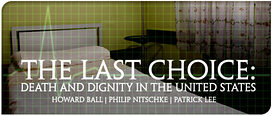I appreciate Patrick Lee’s participation in this conversation about life and death.
We are, however, unalterably at odds on the morality of death with dignity. I appreciate Lee’s ethical foundation. One’s life, he maintains, is always inherently valuable and worthwhile and should be respected. Therefore, one ought not to choose to destroy what is inherently valuable. One should not commit suicide, certainly not with the assistance of a doctor. Because life is worthwhile, medical science will do all it can to relieve your pain–even if this means indirectly causing your death (the “double effect”).
My moral bottom line is rooted in individual autonomy, the liberty of a competent adult to carefully apprehend his existence and to choose an action that he believes is in his best interest. I end with some lines from my first essay and a question:
“When I can’t tie my bow-tie, tell a funny story, walk my dog, kiss someone special,” said a man dying of ALS, “I’ll know that life is over. It’s time to be gone.” For this terminally ill person, PAD is how he will go.
Evidently, this dying person chose to die because, for him, his life was no longer inherently valuable. He has examined his existence and has concluded that very soon the life he has known will be “over” before ALS kills him.
Is it morally wrong for that dying ALS patient, with the assistance of a doctor, to end his life before the illness takes it away? I do not believe that it is morally wrong. If a terminally ill patient, after apprehending his situation, believes he longer has a valuable, worthwhile life, he can choose the “least worst” death.

